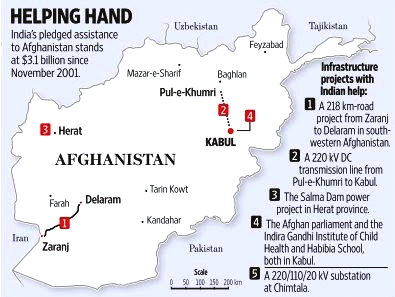Delhi Declaration on Afghanistan | 11 Nov 2021
Why in News
Recently, the Delhi Regional Security Dialogue on Afghanistan was held. The meeting was composed of National Security Advisors’ (NSA) of regional countries and chaired by the Indian NSA.
- The meeting called for “urgent humanitarian assistance” to the Afghan people and urged close cooperation and consultation among the regional countries over the Afghan scenario.
- This is the third meeting of the Regional Security Dialogue (the earlier two meetings were held in in Iran, in 2018 and 2019).
Key Points
- Invited Participants: Afghanistan’s neighbours such as Pakistan, Iran, Tajikistan, and Uzbekistan, Turkmenistan, and other key players including Russia, and China.
- Need: After the withdrawal of US forces and the Taliban’s takeover of Afghanistan, India is concerned about security in the region.
- There is a possibility of terrorism spreading from the territory of Afghanistan.
- Highlights of the Delhi Declaration:
- Secure and Stable Afghanistan: Reiterated strong support for a peaceful, secure and stable Afghanistan while emphasising the respect for sovereignty, unity and territorial integrity and non-interference in its internal affairs.
- Condemning Terrorism: Committed to combat terrorism in all its forms and manifestations.
- Urged the regional members to ensure that Afghanistan would never become a safe haven for global terrorism.
- Ensuring Fundamental Rights: That is, the fundamental rights of women, children and minority communities are not violated.
- The assistance should be provided in non-discriminatory manner across all sections of the Afghan society.
- Collective Cooperation: Called for a collective cooperation against the menace of radicalization, extremism, separatism and drug trafficking in the region.
- Central Role of UN: Recalling the relevant UN Resolutions on Afghanistan, they noted that the United Nations’ (UN) continued presence in the country must be preserved.
- The recent UN Resolution 2593 reiterates the importance of combating terrorism in Afghanistan, including those individuals and entities designated pursuant to resolution 1267.
- Response by the Regional Countries:
- Russia held that multiple dialogue mechanisms “should not complicate” the unfolding situation in the Taliban controlled Afghanistan.
- Pakistan and China too were invited to participate in the consultation but both stayed away.
- Moreover, there was no representation from the erstwhile Afghan government or the Taliban.
- Uzbekistan and Turkmenistan’s NSAs did not mention the word terrorism at all in their opening statements.
- Other Afghan Peace Process Framework:
- Troika Plus Meeting on Afghanistan: The U.S.-Russia-China-Pakistan grouping on Afghanistan peace process.
- Moscow Format on Afghanistan: It was set up by Russia for Peace and stability in Afghanistan in the year 2017.
- It is a six-party mechanism. It involved Russia, India, Afghanistan, Iran, China and Pakistan.
Way Forward
- Inclusive Government: The solution comes only through the formation of an inclusive government with the participation of all ethnic groups.
- Russian Support: Russia has cultivated links with the Taliban in recent years. India would need Russia’s support in any form of direct engagement with the Taliban.
- Bonhomie With China: India should talk with China, with the objective of finding a political settlement and lasting stability in Afghanistan.
- Engaging with Taliban: Talking to the Taliban would allow India to seek security guarantees from the insurgents in return for continued development assistance or other pledges as well as explore the possibility of the Taliban’s autonomy from Pakistan.

